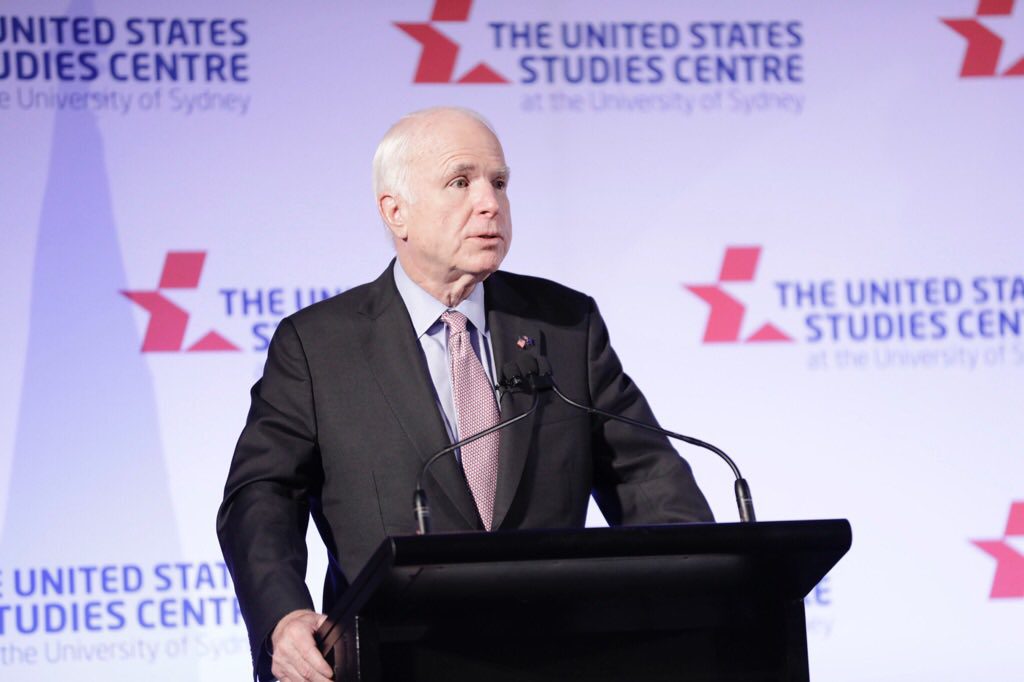Worlds apart: John McCain and Angela Merkel

John McCain’s speech in Sydney this week offered an emotionally-appealing restatement of the orthodox, establishment view of Australia’s alliance with America. In doing so the veteran Republican senator showed quite plainly why that view is inadequate as a basis for our thinking about the future of the alliance and Australia’s place in Asia over coming decades. We’d be wise to pay more attention to Angela Markel’s remarks in Bavaria last weekend.
At the heart of McCain’s speech was a simple and familiar argument. It is that America and Australia are allies not because we share interests and objectives—what he called ‘narrow materialism’—but because we share history and values. He spoke eloquently about our shared history, recalling his family’s long connections with Australia as a military partner. And he spoke very directly about the role of shared values in underpinning and motivating the alliance.
‘Why are we allies?’, he asked, and offered this answer: ‘The animating purpose of our alliance is that we are free societies…who put our faith in the rule of law, and who believe that our destinies are inseparable from the character of the broader world order.’
He spoke of ‘the rights and independence of the weak’, the right ‘to sail the seas, and fly the skies, and engage in commerce freely’, and the need to resist those ‘bent on injustice, and aggression, and conquest’.
‘These are values that time does not diminish,’ McCain concluded. ‘These are ideas that truly are worth the fighting for. This is why we are allies—and why we must remain so.’
One can see the appeal of this. History and values are, by definition, enduring and unchangeable—‘time does not diminish’—so those who passionately want the alliance to endure naturally give weight to them rather than to the shifting sands of interests and objectives.
But reality must be allowed to intrude, and the reality is that alliances only endure when they demonstrably serve clear contemporary national objectives on both sides, and when the costs they impose are worth the benefits they bestow.
Those who really care about the alliance and its future should look beyond the warm generalities of history and values and examine the cold facts. How far do our strategic interests and objectives converge with America’s in the decades to come?
This isn’t an abstract question. Each country needs to ask what exactly is—in McCain’s words—‘worth fighting for’ in Asia. Talk of values is cheap, but fighting for them against an adversary as powerful as China, as McCain seems to be suggesting, is not. Over the past few years it has become less and less clear that America is willing to accept the costs and risks of defending the regional order from China’s challenge.
That was so even before Americans elected Donald Trump, and it is much plainer now. McCain urged us to ignore Trump as an anomaly. He wants us to believe, as he does, that the real America remains committed to upholding its global leadership at any cost. But all the evidence from last year’s election—on both sides of US politics—points the other way.
Trump may be unprecedented, but he isn’t an anomaly. His election is the clear consequence of long-standing trends in US politics. And while Trump might not last long, the trends and attitudes he represents, including his ‘America First’ isolationism, will persist.
And why not? Traditionalists like McCain talk tough, but they have no credible ideas about how America should perpetuate its leadership in today’s world. In particular, they have no idea what to do about China. McCain’s ‘Asia-Pacific Stability Initiative’ is little more than a rebadged ‘Pivot’, and would fail just as the Pivot did, because it doesn’t commit anything remotely approaching the massive resources required to meet China’s challenge.
There’s a reason for that. No one believes that Americans today would support a policy which commits the resources required. That means we would be very unwise to expect that America will sustain its leadership in Asia, and if it doesn’t, then—history and values notwithstanding—it won’t need Australia as an ally.
Nor is Australia’s commitment to supporting America nearly as clear-cut as our alliance rhetoric suggests. For all our tough talk, Australian governments haven’t been willing to support America in pushing back against China in any way that might damage our standing in Beijing. And how much weight would our shared history and values have if we ever do have to choose whether to support America in a war with China?
We aren’t alone in facing these questions. Around the world America and its allies are struggling to understand what their alliances mean in a changed world in which America’s relative power and resolve are much depleted, and it confronts major challenges in several key regions.
This is the reality that Angela Merkel has acknowledged so frankly. It isn’t just about Donald Trump. Under any president, how credible is it that America would risk a nuclear war with Russia to save Estonia from Vladimir Putin? Or Poland, come to that?
The difference is that Merkel has the courage and candor to acknowledge the problem, which is the essential first step towards doing something about it. Senator McCain doesn’t, and neither do we.


 Image of the University of Queensland: Universities Australia.
Image of the University of Queensland: Universities Australia.